Push starting a vehicle is a way of starting an engine if the battery is dead or does not have sufficient charge to turn the starter motor. This method of starting the engine is also known as bump starting or popping the clutch and is usually used for manual transmission vehicles.
Is there a similar method to starting automatic vehicles, specifically your ATV, if the battery is not operating at optimal capacity? Generally, only ATV’s with certain types of automatic transmissions can be push-started safely. If you try to push-start an automatic ATV with the incorrect transmission type, it will at best not start and, at worst, cause damage to the transmission.
If your ATV can be push-started safely, then here are 3 steps to get your ATV started.
There may only be three steps to this push-start procedure, but there is more to the three steps than what first glance portrays.
Remember: Before trying any push-start method on your automatic transmission ATV, you need to make sure it is capable of starting using this method and that no damage will be caused by attempting this method!
Many ATV riders will tell you that you cannot push-start an automatic ATV, and in most instances, they are correct. Some automatic transmissions require the parts of the gearbox to be rotating before a gear can be selected, while others rely on the compression of a running engine to engage the clutch.
There are, however, some ATVs that can be started using this method, particularly if they have hydraulic pumps.
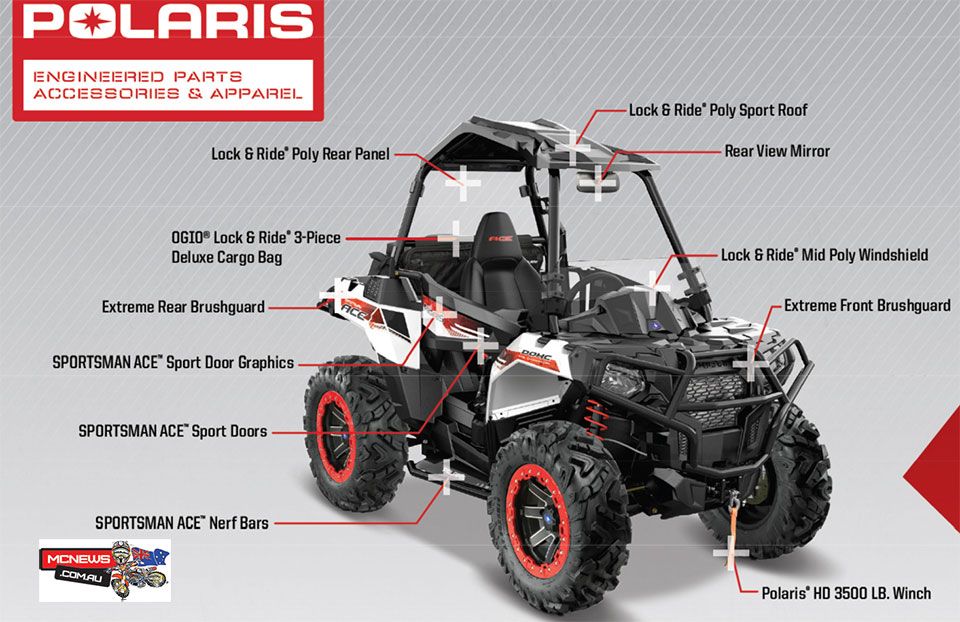 The incline that you use as a starting point will, therefore, need to be high enough and have a steep enough angle to achieve this purpose.
The incline that you use as a starting point will, therefore, need to be high enough and have a steep enough angle to achieve this purpose.This process can be an exhausting undertaking if you are doing is all using man-power. Pushing an ATV up a hill may require what some would consider superhero-type strength! After pushing your ATV to the top of a hill two or three times, you will begin to wonder why you started off-roading on your ATV to begin with!
The physical effort required to perform this task repeatedly may prompt you to employ another method to gain the necessary momentum to start the ATV. You may try towing your ATV with another ATV or behind a truck.
You may try towing your ATV with another ATV or behind a truck.
This is, however, a potentially hazardous way to try and start your ATV, and you should weigh up the risks to determine if it is really worth it.
If you struggle to push-start your ATV or your transmission does not allow for this starting method to be used, you may want to try one of these other methods to get your ATV fired up!
Another method commonly used to start vehicles with battery problems is to use jumper cables from one vehicle’s battery to another.
The idea behind the jumper cable method is that the vehicle with a battery that is in good working order will supply a charge to the problematic battery. This charge should be enough to allow the engine to be started.
This is a well-known and widely used method in vehicles that are of the same type but requires some care when you are attempting this method with vehicles that are different.
For example, using another ATV to connect to your ATV battery is a safe method. Make sure the batteries are connected positive to positive and negative to negative. Start the donor ATV and wait a few minutes while it delivers charge to the ailing ATV. It sometimes helps to keep the revs slightly elevated on the ATV that is doing the charging. After a few minutes, try starting the ATV normally with the leads connected and the second ATV running.
Make sure the batteries are connected positive to positive and negative to negative. Start the donor ATV and wait a few minutes while it delivers charge to the ailing ATV. It sometimes helps to keep the revs slightly elevated on the ATV that is doing the charging. After a few minutes, try starting the ATV normally with the leads connected and the second ATV running.
If the ATV is still struggling to start, you may want to try and let it charge a bit longer before trying to start it again.
A second example is using a car or truck to provide the charge, and this is where some additional care needs to be exercised due to the differences between the two vehicles.
When using a car as the charging vehicle, you can connect the cables to the battery as normal, but leave the car turned off. Do not switch on the ignition or start the car as the differences in the electrical systems may cause damage to your ATV or the car.
With the batteries connected, wait a couple of minutes for a charge to build up in the ATV battery and then try to start the engine of the ATV.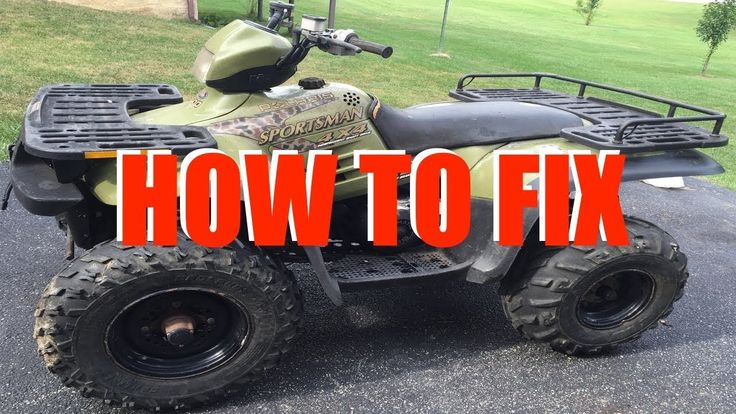 Hopefully, you should be able to get your ATV running after a couple of attempts.
Hopefully, you should be able to get your ATV running after a couple of attempts.
If your ATV battery is completely dead in that it does not even power the ignition lights to some degree, then the problem of starting your ATV takes on a different dimension.
With a completely dead battery, it may be possible to get the engine started using the push-start or bump-start method, but the battery may not hold the charge. If your battery is in this condition, it will not be able to successfully store a large enough charge to start the engine after the ATV has been switched off.
If you are using the cable start method, you may fail to get the ATV to start at all. This is because this method depends on the good battery being able to charge up the flat battery to the point that it can start the engine. If the flat battery is faulty and unable to hold a charge, then this method may not work to get the ATV started.
If your battery is in this condition, the only solution is to replace the battery with a new one. This should solve much of your ATV starting problems.
If the battery is the cause of your starting problems on your ATV and the methods already mentioned are not achieving any success for you, then you may wonder if there are any other options.
Unfortunately, due to the simplicity of the way the battery system works, there are not many different ways to achieve a current flowing in the circuit. Your only other option may be to take your ATV to a mechanic for a professional diagnostic to be run to establish the problem.
Some methods are purported to work, such as connecting a drill with an impact socket to the flywheel nut and running the drill in reverse. If the ATV is in neutral, the ignition is on, and the kill switch is in the on position, the drill can turn the flywheel sufficiently to induce a current in the coil enough to provide a spark.
This method may seem easy, but it lacks some practicality, as it only works on smaller engines and requires you to have a drill and impact socket on hand at the time your ATV won’t start!
Starting issues caused by battery problems are notorious for appearing at the most inconvenient times, such as when you have no tools at hand or a fellow off-roader to help you out. This should not be looked at as a downside to the activity, but rather as a part of the adventure that is ATV off-roading!
Choose to learn from the experience so that you are better prepared the next time the problem occurs, or you are in a position to help another off-roader who suffers from the predicament!
Happy ATV’ing!
If your ATV battery is dead, your engine won’t turn over. If you’re home and have a charger, it’s not a big deal. But if you’re out on the trail, or don’t have a battery charger, dead batteries can be a real pain. Knowing how to jump start your ATV battery can save you a major headache while out on the trail. Most ATV batteries are 12 volts dc, like a car or motorcycle battery.
Most ATV batteries are 12 volts dc, like a car or motorcycle battery.
I’ve used the compression method I talk about below on my quad before, and it does work. I was a couple miles from camp and I shut my engine off to take in the scenery and walk around a bit. When got back on my quad to head back to camp, the dang thing wouldn’t start. I was able to get it started using the bump (compression) method, and I’m sure glad I knew how to do it rather than trying to push the quad all the way back.
First thing is to make sure the battery is really the problem here. Your battery will slowly lose power over time if it has been sitting. The longer the ATV sits without the battery on a charger, the more likely it is that the battery could have died. You really should be hooking the battery up to a charger if it’s going to be sitting for 3 months or more.
If you try your push button start (or turn key start) and nothing happens, the battery may be dead. Make sure your run switch is turned on and your machine is in neutral.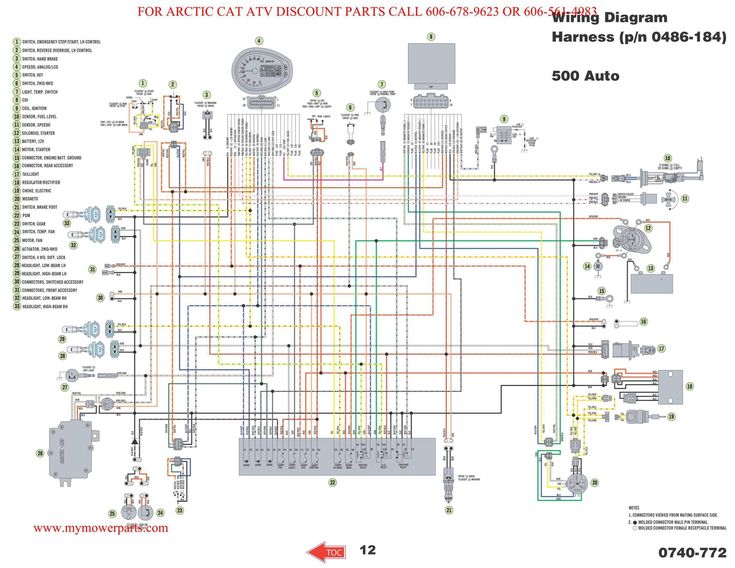 If you have a key, the key will need to be in the run position also. Try turning your headlights on if you have them. This can be deceiving because the battery might have enough power to run the headlights but not turn over the engine. But if they headlights (or any other lights) don’t turn on, you can be more certain the battery is dead.
If you have a key, the key will need to be in the run position also. Try turning your headlights on if you have them. This can be deceiving because the battery might have enough power to run the headlights but not turn over the engine. But if they headlights (or any other lights) don’t turn on, you can be more certain the battery is dead.
If your engine turn over but very slowly, it may be the battery. The battery might have enough juice to turn the engine, but not fast enough to get it started. You would hear the motor spin a little but then slow down and stop. If you hear just a clicking sound, but the motor doesn’t turn or do anything, it could be the battery. There could also be a loose connection between your battery and starter. Check and tighten the connections to the battery terminals and to the starter.
Once you’re fairly certain it is the battery, you can try jump starting it. If you’re home and have a charger, there may be no need to jump start. Try just charging the battery first. The charger I use is a Ctek Smart Charger found here on Amazon. It’s sold at a good price (around $60-70) and has all the connections for any brand of battery your ATV has. I chose this battery charger because of its price, and how easy it is to use.
The charger I use is a Ctek Smart Charger found here on Amazon. It’s sold at a good price (around $60-70) and has all the connections for any brand of battery your ATV has. I chose this battery charger because of its price, and how easy it is to use.
Sometimes this happens out on the trail, where you don’t have a charger. Or maybe you don’t have a charger at home. Whatever the case, you could always jump start your ATV using jumper cables or the compression start method.
This method is commonly known as bump starting an ATV, or popping the clutch. You basically have to push the quad fast enough so that when you let the clutch out the engine turns over and starts. Most ATV’s are light enough to be pushed by a normal sized adult on flat ground. If you can get going downhill, it makes this a lot easier.
Your starter motor is usually what’s used to start the engine. It draws power from the battery to turn the engine over, which fires the spark plugs and gets the engine running. With the compression method, you are using the tires and momentum to turn the engine over.
With the compression method, you are using the tires and momentum to turn the engine over.
Here is a step by step of how to do it:
That’s it! You should hear the engine turn over when you do this. If you’re having a hard time you can try giving it some gas as it starts to turn over. The engine should fire up, when it does, pull the clutch back in. That will prevent the machine from taking off on you as soon as it’s running. It might take a few tries to get it done this way, but it does work.
If the tires skid instead of turning the engine over, try going into 3rd gear and repeating the steps. If the tires still skid, try on more solid terrain or somewhere where the tires have better grip.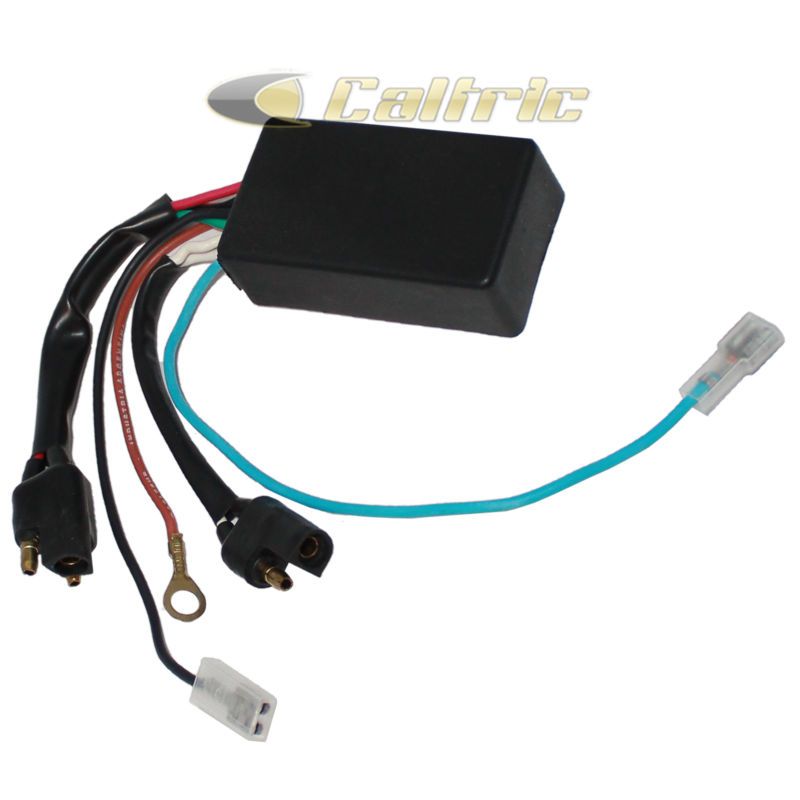 Once the engine is running, it should charge your battery back up.
Once the engine is running, it should charge your battery back up.
If your ATV is an automatic, you won’t have a clutch, and may not have a way to select which gear you’re in. The bump start (compression start) method won’t work the same for you. I have seen people put the ATV into neutral, get it rolling, and drop it into drive to start the machine. But I think doing it this way could damage the transmission. I would only do it that way on an automatic as a last resort.
This is pretty straight forward, and is the same method you would use to jump start a car. You can use another ATV battery or even a car battery if that’s all you have. It’s a good idea to wear rubber soled shoes when you work on anything with electricity. The voltage’s and amperage’s of car and ATV batteries aren’t enough to cause serious damage, but it’s a good idea to be careful around the terminals to avoid damage to your vehicle or ATV.
For this method all you need is a simple set of Jumper Cables like this one I found on Amazon, and another ATV. First, remove the seats to gain access to the battery. Some quads require that you also remove a battery cover. Connect the jumper cables to the good battery first, making sure the positive and negative of the other end of the cables aren’t touching. Then connect to the bad battery.
First, remove the seats to gain access to the battery. Some quads require that you also remove a battery cover. Connect the jumper cables to the good battery first, making sure the positive and negative of the other end of the cables aren’t touching. Then connect to the bad battery.
You should notice a plus sign or red flag on the battery indicating positive, and a minus sign or black flag indicating negative. Connect the negative (black) first, then the positive (red). You can hook the negative (black) end directly to the frame of the ATV, just make sure it is grounded. This can also help prevent a surge in the electrical system that could damage your machine.
Once you have both batteries connected with the jumper cables, you can start the ATV with the good battery. Let the ATV run for a few minutes. This charges your battery a little bit, and helps when you try to start it. Now you can try starting the other ATV. If it starts up, remove the red cable (positive) and then the black (negative), do this for both ATV’s.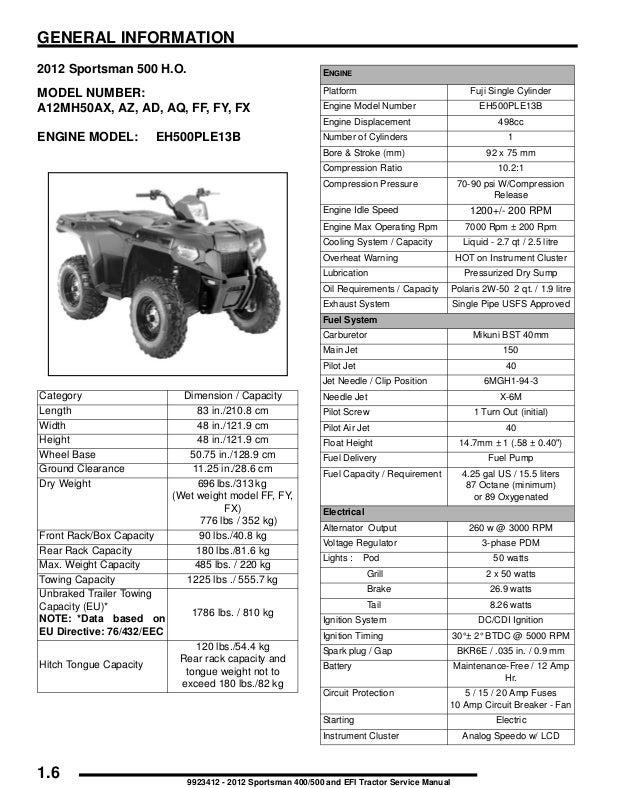
You should leave the engine running for a while after a jump start. That will let the battery charge back up a little bit. If you immediately shut the ATV off, you will need to jump start it again. I’d let it run for a good half hour, I usually go ahead and ride it around for a little while, why not?
The hook up for this method is the same as ATV vs ATV or car vs car using jumper cables. Hook to the good battery first, negative (black) then positive (red). The car battery and charging system is much stronger than an ATV battery, and could cause damage to the ATV’s electrical system if you turn on the car. This is because the alternator in your car charges batteries at a higher rate than your ATV battery can handle. For this reason, Do Not turn on the car at any time during this jump start. The car battery should have more than enough juice to start an ATV.
After you have the jumper cables hooked up, simply wait a minute, and try turning on the ATV. If it starts up, then you know the battery was the problem. Once the ATV is started, remove the cables from the ATV first, positive (red) then negative (black), and then from the car. I have done this with my truck, just to make sure it will work for you, and it works well.
If it starts up, then you know the battery was the problem. Once the ATV is started, remove the cables from the ATV first, positive (red) then negative (black), and then from the car. I have done this with my truck, just to make sure it will work for you, and it works well.
This is one of the simplest most straight forward methods. But it’s more expensive because you need to have a battery pack in order to jump start the ATV. This method is similar to using jumper cables except instead of hooking your ATV to another ATV or a car, it’s hooked to a pre-charged battery pack. If you don’t want to carry an extra battery pack with you on your quad all the time, this method may not be for you.
The battery pack we use can also charge our smart phones and tablets, so it’s nice to have on a camping trip anyway. And if my four wheeler’s battery ever dies, it’s a super convenient way to get back riding again. The battery pack I use is called a Portable Jump Starter found here on Amazon. It has a built in flashlight and USB ports to charge phones or tablets, or anything that can charge through a USB port. All the cables and things you will need to hook up to your ATV battery are included.
It has a built in flashlight and USB ports to charge phones or tablets, or anything that can charge through a USB port. All the cables and things you will need to hook up to your ATV battery are included.
If you have the extra money, or go camping a lot with your four wheeler. This is the best way to get your battery charged again without needing to pop the clutch, or needing another ATV or car nearby. You simply hook the included alligator clips to your battery, and then hook the cable to the battery pack. Once everything is connected, try to start the engine. The engine should start right up. You may have to wait a couple minutes to let the battery charge a little bit.
It’s always best to never need to jump start your ATV, but it happens sometimes. Taking care of your batteries and keeping them properly charged will save you a headache in the long run. To learn more about how to charge a battery and keep it charged while not in use, check out my How To Charge An ATV Battery article here.
Sharing is caring!
Content
New models of ATVs are equipped with an electric starter. Therefore, problems with starting almost never arise. But in older models, 9 can be installed0029 manual kick starter . With him, beginners sometimes have difficulties.
To start the ATV, do the following:
 You need to squeeze the clutch (if any), and then set the switch to the "neutral" position. The light on the control panel usually comes on at this point. You can also try pushing the ATV. If the wheels are spinning, then everything is done correctly. nine0008
You need to squeeze the clutch (if any), and then set the switch to the "neutral" position. The light on the control panel usually comes on at this point. You can also try pushing the ATV. If the wheels are spinning, then everything is done correctly. nine0008 Start the CFMOTO 500 with a manual starter?
Watch this video on YouTube
Paradoxically, but sometimes the owners of ATVs simply forget to pour gasoline into the tank. Therefore, before proceeding with the diagnosis, it is worth checking the fuel level. nine0003
Therefore, before proceeding with the diagnosis, it is worth checking the fuel level. nine0003
It is not uncommon for the cause of the problem to be insufficient battery charge . It can be charged at home. If the ATV is small, you can purchase an additional battery. The cost of batteries for budget models is relatively low.
How to start an ATV?! If the battery is dead!? Life hacks! Subscriber reply | Irbis Atv 250s | SJ8Pro
Watch this video on YouTube
If the battery is good, but the starter does not work, it may be worth looking for the cause in the starting system. It is necessary to try to close the contacts, which are located on the starter relay. To do this, you need to use a screwdriver. The relay is usually located under the seat. Two thick wires are connected to it.
If you need to find a way to start the ATV without a key, you can also follow these steps.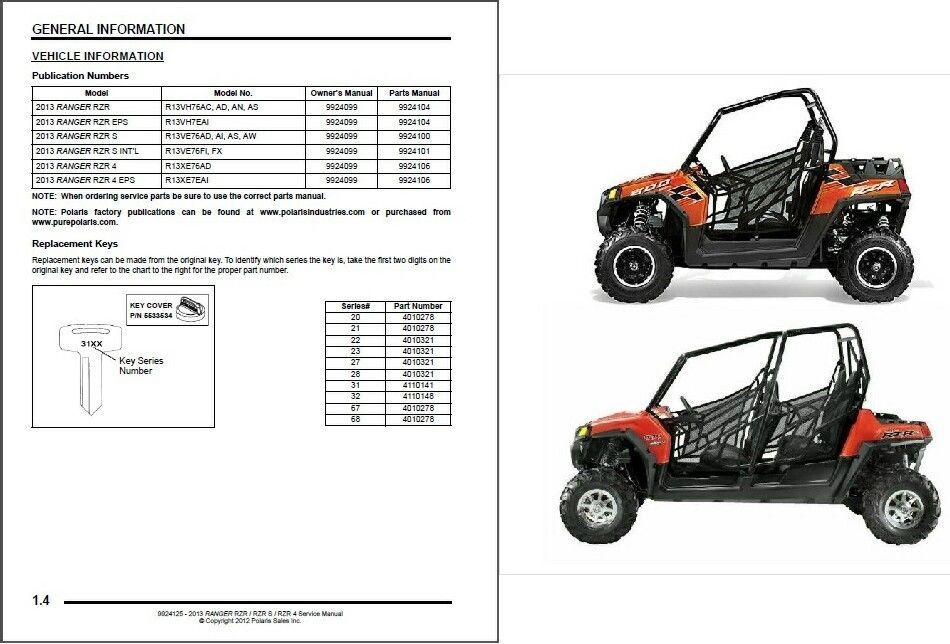 This technique will be effective only if the system is not controlled by the central computer . Otherwise, blocking will work.
This technique will be effective only if the system is not controlled by the central computer . Otherwise, blocking will work.
If, after the manipulations, the engine starts up, then the problem is in the launch system . Otherwise, you will need to look for the cause of the malfunction further or visit a service center.
Each ATV has a stop button on the steering wheel. Usually it is red. This button is responsible for turning off the ignition, it turns off the engine . If you do not bring it to its previous position, the engine, of course, will not start. Therefore, it is worth checking in what position the "Stop" button is located.
Another security system provided in ATVs is a special check. This is a cable that is attached to the ATV at one end and to the driver at the other. If the latter falls off the ATV while driving, check flies out and the ignition turns off. You won't be able to start the vehicle without this receipt either. If this part is lost, you will need to look for the appropriate contacts and close them directly. nine0003
You won't be able to start the vehicle without this receipt either. If this part is lost, you will need to look for the appropriate contacts and close them directly. nine0003
Another possible reason why the ATV won't start is a blown fuse. If the ATV is small, there is usually only one fuse. He is located next to the battery . The suitability of this part for operation can be assessed visually. The cost of the fuse is cheap, so it is better to have several of these parts in stock.
If there is no spare fuse, and the failure happened away from home, you can insert wire instead. This is a temporary solution that will allow you to get home. It is impossible to constantly replace the fuse with wire. You can burn much more expensive elements of the system.
This part is located under the saddle or next to the motor (depending on the model). It's a small box with wires coming out of it. They are connected to the ignition coil. It is difficult to assess the health of this part, so it is better to contact a service center with a similar problem. nine0003
They are connected to the ignition coil. It is difficult to assess the health of this part, so it is better to contact a service center with a similar problem. nine0003
If the spark plug wire is broken or the ignition coil is broken, it will not be difficult to check the performance of these systems. The candle is unscrewed and inserted into the candle cap. Next, you need to attach it with the metal side to the engine and press the starter button. If there is no spark between the electrodes, this is a sign of a breakdown. Try cleaning the spark plug electrodes and adjusting the gap between them.
If there is a spark, then the problem lies either in the candle cap or in the candle. You need to buy a new part and change it. nine0003
It will be possible to eliminate many malfunctions and start the ATV even in the forest. For models with a manual transmission, you can try to start the engine from the pusher. It should be said right away that this cannot be done with an automatic transmission. In other cases, it is recommended to look for the cause of the breakdown according to the points listed above.
It should be said right away that this cannot be done with an automatic transmission. In other cases, it is recommended to look for the cause of the breakdown according to the points listed above.
How to start an ATV with a PUSHER
Watch this video on YouTube
ATV won't start? Don't know where to start troubleshooting? Then let's try to find out the main reasons why an ATV may refuse to start.
Unfortunately, the equipment of any manufacturer sooner or later starts to act up, no one is safe from this, but finding a malfunction and starting an ATV that refuses to start is not so easy, especially if you are far from a service station. nine0003
No matter how trite it may sound, the first thing to do is to check the presence of gasoline in the gas tank: believe me, very often a person tries to start an ATV with a dry tank.
Check if the engine power button is disabled, it is usually located on the steering wheel on the left side, and also pay attention to the fuses, one of them may have blown.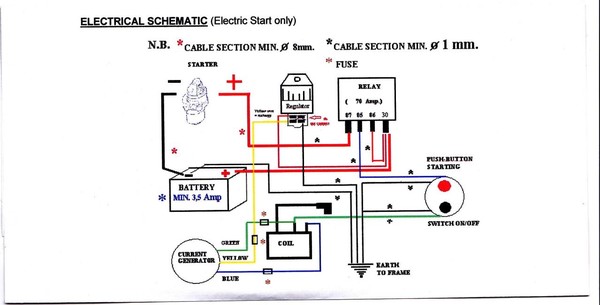
Next, take a multimeter and measure the ATV battery charge level: a charged battery should produce from 12.6 to 12.8 volts and confidently turn the starter, if the battery is low, charge it. nine0003
It is also necessary to pay attention to the battery terminals, they must be clean and not oxidized, and the clamping bolts must be tightened.
If, when trying to start the ATV, you notice that the starter does not turn, you must first check and, if necessary, replace the starter relay. To check if the starter itself is working, you need to make sure that the engine mass is in good condition (oxides, no contact, wire damage) and apply positive to it directly from the battery (observing the polarity), if the starter spins, look for a problem in the wiring. If there is no reaction to your actions, most likely the starter is out of order. nine0003
Check spark plug condition and spark. This is what a spark plug looks like when installed in a serviceable and tuned engine:
If you notice a significant deviation in the color of the spark plug, you may need to tune the ATV carburetor.
In order to check the presence of a spark, you need to unscrew the spark plug, insert it into the candle cap, lean it against any metal part of the ATV (do not forget about safety precautions: there should be no gasoline smudges nearby) and turn the starter, the spark should be sure and distinct noticeable. If there is no spark, it is necessary to replace the spark plug, if there is no spark, look at the wiring, and also replace the ignition coil. nine0003
Make sure your ATV's air filter is clean and saturated and the air pipe from the filter to the carburetor is free of damage or blockage.
Determine if fuel is entering the carburetor, if the fuel filter is clean, if the fuel pipes are intact, clean the carburetor with cleaning fluids and blow out the passages.
Determine if the fuel pump is good. After turning on the ignition, you should hear the sound of turning on the fuel pump and pumping gasoline into the fuel system. It is also necessary to check the operation of the fuel pump relay.